In a country where cars are king, Tufts’ host cities stand out for their embrace of an unusual alternative: the cargo bike. Designed to transport almost anything — groceries, work supplies or even children — these bikes are becoming increasingly popular for families hoping to minimize transport expenses and foster a more connected lifestyle. Oh, and skipping out on car traffic doesn’t hurt.
A popular choice among local families is the Dutch-style “bakfiet,” a bicycle with a large front box that can hold several children. Boris Vallee lives one block from the Tufts campus in Medford Hillside with his 6-year-old son and 4- and 2-year old daughters. Originally from France, Vallee uses a bakfiet-style Riese and Müller Load 75 to take his three children around the Tufts area.
“I have many friends in France that are doing that to bring their kids [around],” Vallee said. “I wanted both to improve my environmental footprint and have a different way of commuting, getting through traffic and having a nicer lifestyle.”
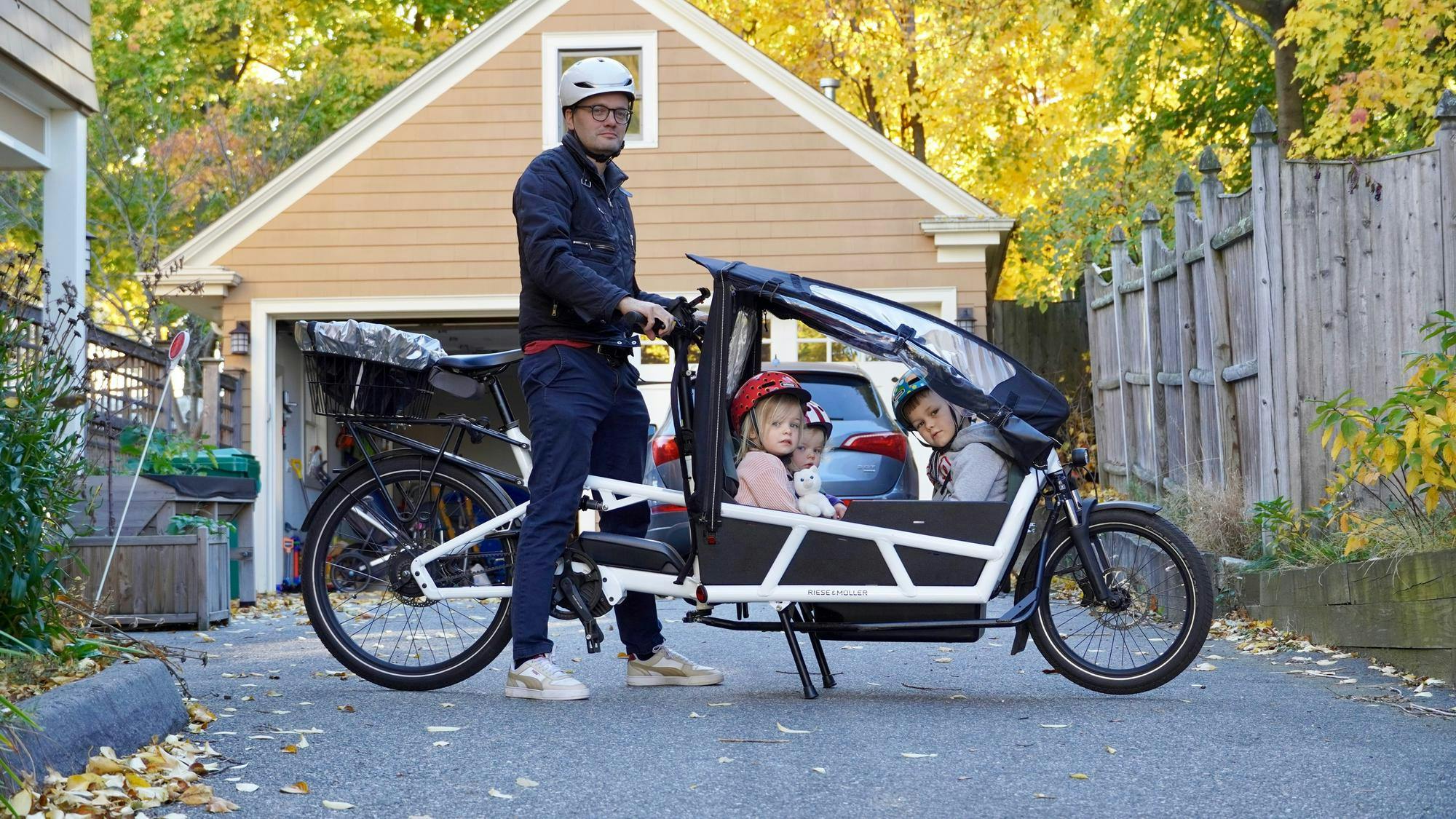
Boris Vallee is pictured with his children.
In nearby Magoun Square, Klaus and Mimi Schultz rely on an Urban Arrow to ferry their kids around town. They chose the model for its utility and ability to carry an additional child on top of their two sons.
“We could potentially carpool — ‘bike-pool’ — and [I love] the amount of groceries [Klaus] can fit,” Mimi said. “He jokes it’s his midlife crisis vehicle.”
The Schultz family uses a special wooden accessory handmade in Somerville called the “Tow Monster” to attach their older son’s bike to the Urban Arrow. Klaus allows his son to bike alongside him on the way to school; since their son won’t be biking home, he tows the additional bike to the office. The cargo bike suited their needs so well that they ordered a second.
Another widely favored style of cargo bicycle around Tufts is the “longtail,” which features an extended rear rack that can accommodate child seats or a bench for older children. Tufts alumnus Nathan Ricci lives in Magoun Square with his wife, also a Tufts alum, and uses a Tern GSD cargo bike to navigate with his 6-year-old son.
“Driving around here is really frustrating. I think I have an above-average hatred for traffic and being stuck in traffic,” Ricci said. “It just seemed like a pretty obvious solution if you need to transport kids.”
The purchase of a cargo bike allowed Ricci’s family to avoid purchasing a second car, a common sentiment among families. For almost any trip under 5 miles, Ricci opts to use the cargo bike, having now racked up over 7,000 miles on it. “It would be more, except I got a lot less mileage during the pandemic,” he said.
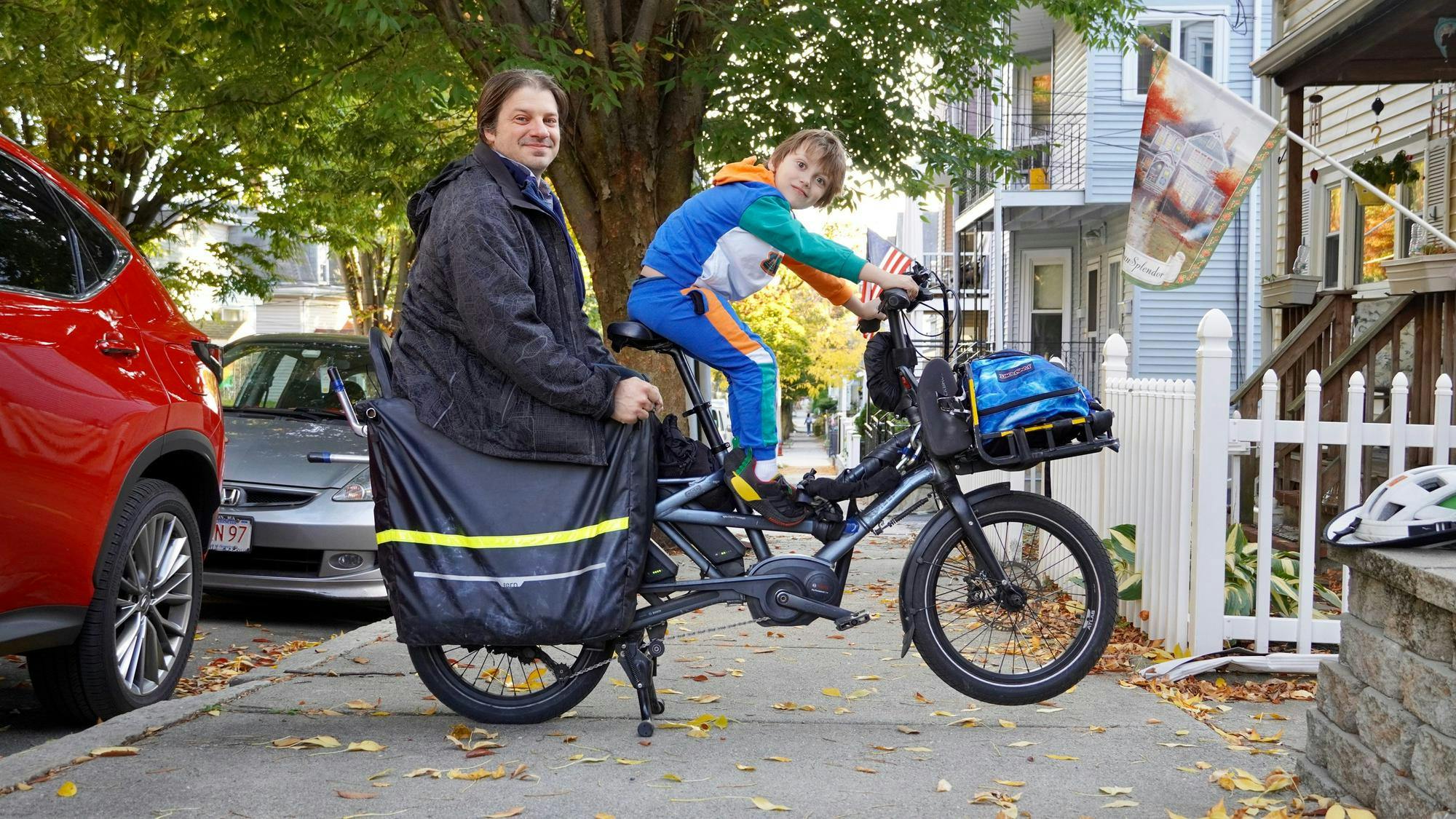
Nathan Ricci and his son are pictured.
The third type of cargo bicycle commonly found near Tufts is the “trike.” With three wheels, these bikes are highly stable and can carry more than four children at a time. Jessica Deary lives in Arlington along the Minuteman Bike Path. She and her husband Victor purchased the tricycle-style Bunch Bike for their 3- and 1-year-old daughters. Originally from Hartford, Connecticut, they use the Bunch Bike to take their girls to the library and nearby parks.
“When we came here, we downsized to one car,” Victor said. “When we were in Cambridge, it was easier to work, but we always had to coordinate with a car. But since we’ve gotten this, it’s a lot easier.”
The Bunch Bike makes it possible to mount a toddler seat designed to support children from ages 18 months to two years. And their daughters are fans, too: “They never fight getting in it, compared to the car, which they often don’t want to get into,” Jessica said.
Cargo bicycles have long been popular in countries like the Netherlands and Denmark, which have strong bicycling cultures and flat topography. As for their spike around the more hilly Tufts, the addition of electric batteries may be to thank.
“[Cargo bikes] have existed for at least 100 years, but having lithium-ion batteries and the development of electric motors, they’ve reached a level of quality now,” Ricci said. “If you want to take one of those up a steep hill with two kids in it, now you can.”
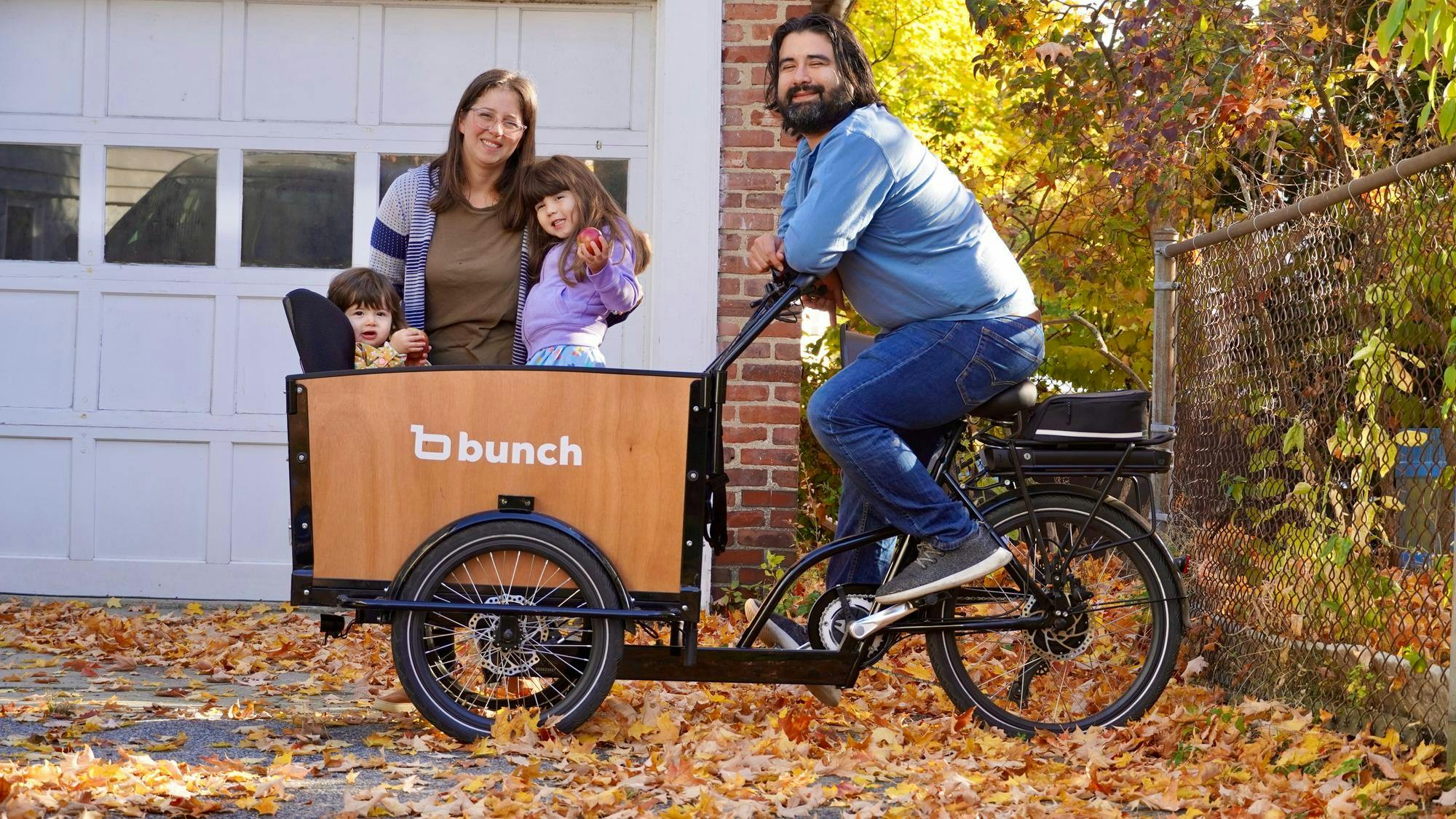
Jessica and Victor Deary are pictured with their children.
For these cargo-biking families, safety is the first priority. Vallee estimates that he’ll be carting around his kids until they’re old enough to bike solo in traffic — a long way out. Local government has also been investing in safe biking, building protected lanes and extending the Somerville Community Path. Ricci credits Somerville and Cambridge with making biking infrastructure “more appealing.”
“Nobody’s going to ride their bike around with a kid if it doesn’t feel safe,” he said. “Your risk tolerance is so much lower when you have a kid.”
And they’re not just fair-weather vehicles. Vallee uses his cargo bike year-round; he outfits his R&M Load 75 bicycle with a cover to keep his children warm during colder months.
“[The little tent] is needed for it to work for the children. They keep themselves warm — they’re like penguins,” Vallee said. “You just need to be well dressed, and then, it’s all good.”
Judith Fortin recently began using a Tern HSD to transport her young daughter and Boston Terrier to school and around Cambridge. While initially nervous about pedaling Massachusetts Avenue, Fortin has found that the benefits outweigh the risks. She also plans to continue as the weather gets colder.
“I’m trying to see if I’m going to buy all the gear for winter or if we’re going to dress up and tough it out,” Fortin said. “I’m from Quebec, so I’m used to cold weather. [My daughter is] not used as much, being born and raised here.”
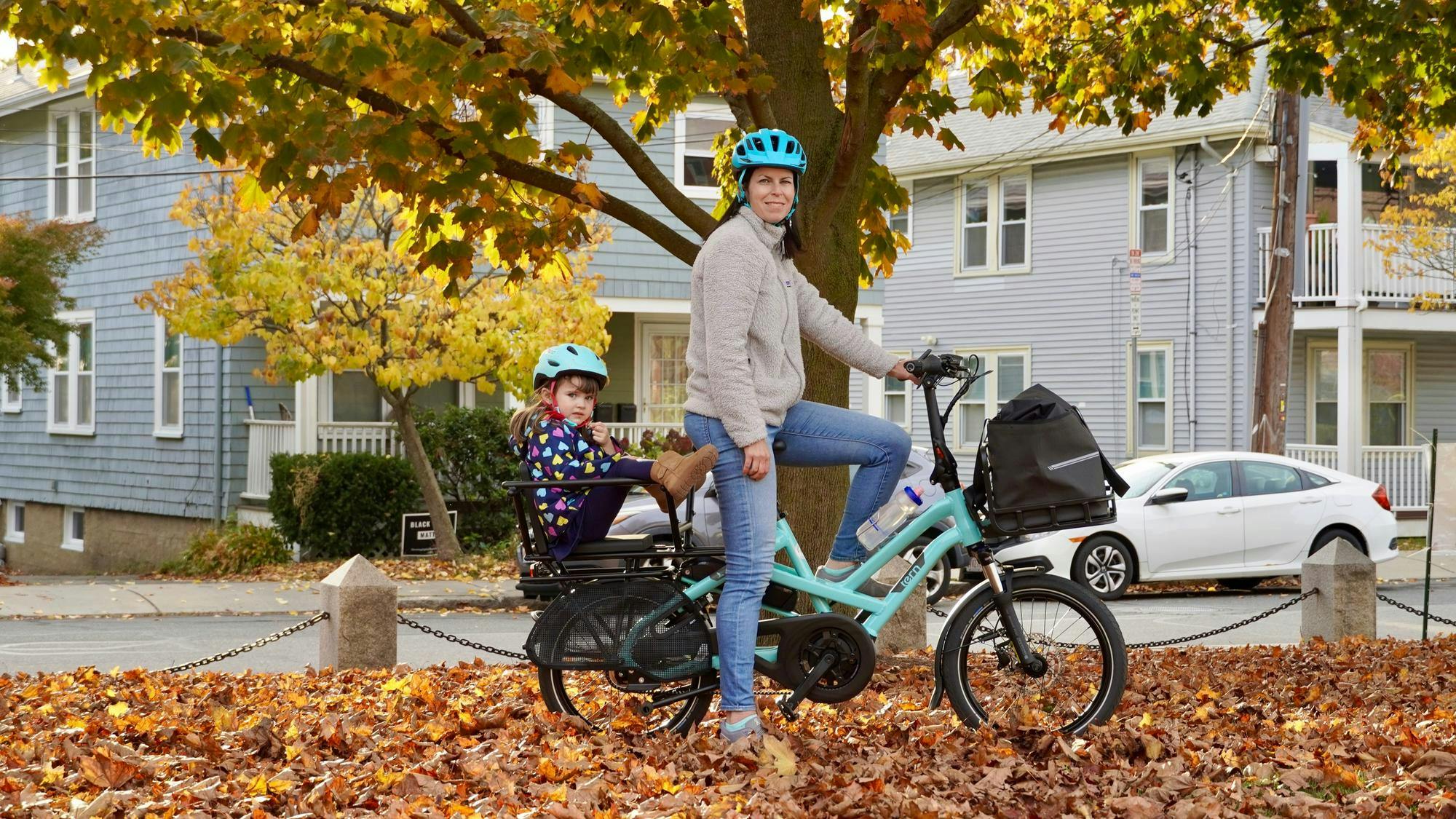
Judith Fortin is pictured with her daughter.
Over in Arlington, Derek Paxson took more of a do-it-yourself approach to find the perfect cargo bike for his family. Due to limited storage at their home near Alewife Brook Parkway, he and his wife weren’t interested in a bakfiet-style bicycle, and many of the other traditional options for cargo bikes were not suited for an infant young enough to need a car seat.
Drawing on his background as a mechanical engineer, Paxson custom built a wooden rack with suspension to mount his son’s infant car seat to the front of a Cero One cargo bicycle. He then moved the original front rack to the bike’s rear, allowing them to hook on a stroller. With his bicycle, Paxson can take his infant and baby supplies anywhere he wants to go: “I’ve told people it’s like when you first learn how to ride a bike, and you’re a kid, and you can go everywhere,” he says.
The higher upfront cost of cargo bikes can be a barrier for some, with most models ranging from $1,700 to $9,000. Paxson was able to snag a gently used cargo bicycle from Facebook Marketplace; however, because cargo bikes are a newer phenomenon in the United States, the secondhand market is still developing.
“Especially the ones with the bucket in the front, where you could actually buy something to put a car seat, these bikes are like five grand minimum, and they’re not that old, so there’s not that many used,” Paxson said. “Luckily, I stumbled upon this one.”
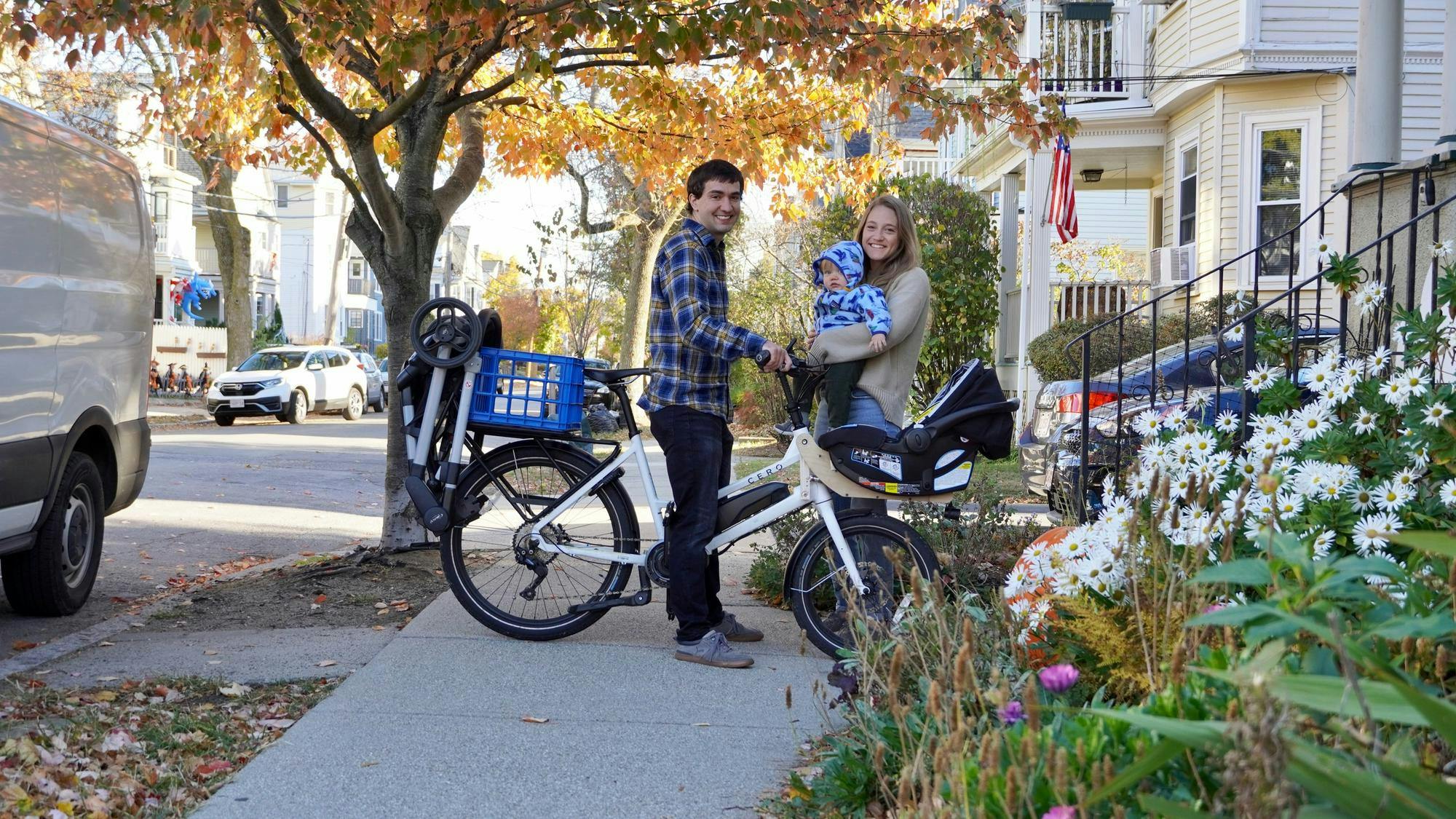
Derek and Leah Paxson are pictured with their child.
The Tufts-area families point to several instigators for the cargo bike spike. There’s the increased biking infrastructure, the focus on sustainability and even the simple joys of pedaling around with your kids in tow. But they all agree: The cargo bikes have brought them joy.
“It has improved [my] quality of life a lot,” Ricci says. “It’s easier to get around; it’s faster to get places. You go to local places more; you enjoy the outdoors more. I know everybody in the neighborhood because … I’m not inside a car, so I see people, and I talk to them.”
Now, the cargo bike feeding frenzy shows no signs of fading. In fact, they might be getting too popular near Tufts. “I’m not a morning person, so I usually use [my cargo bike] in the afternoon,” Fortin said. “Too much bike traffic in the morning, to be honest.”




